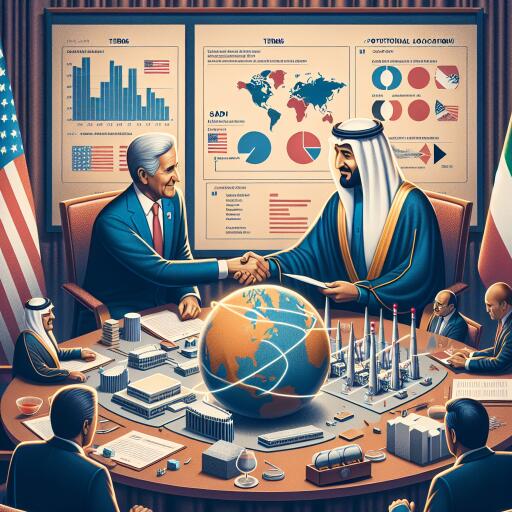
Exploring the Potential of a US-Saudi Civil Nuclear Agreement
In a significant development indicating a deeper strategic engagement between the United States and Saudi Arabia, discussions have surfaced about a potential civil nuclear cooperation agreement. This move is part of a broader diplomatic effort which is believed to not only fortify bilateral relations but also pave the way for larger geopolitical realignments in the Middle East, including a potential normalization between Saudi Arabia and Israel.
The Essence of Civil Nuclear Cooperation Agreements
A civil nuclear cooperation agreement, as authorized by the US Atomic Energy Act of 1954, allows for substantial civil nuclear collaboration between the United States and other nations. Such agreements are critical for ensuring the peaceful use of nuclear energy, stipulating stringent nonproliferation safeguards to prevent the development or transfer of nuclear arms technologies. These pacts undergo thorough congressional scrutiny, reflecting their significance in international relations and nuclear nonproliferation.
Saudi Arabia’s Nuclear Ambitions
At first glance, Saudi Arabia, the luminary of the global oil sector, might not seem an obvious aspirant for nuclear energy. However, diving deeper into the kingdom’s strategic objectives reveals a twofold rationale. Under its Vision 2030, Saudi Arabia aims to diversify its energy sources, incorporating significant renewable and nuclear energy into its mix, thereby reducing its carbon footprint and freeing up more oil for export.
Simultaneously, there is speculation about Riyadh’s interest in developing nuclear expertise potentially to hedge against regional nuclear ambitions, particularly concerning Iran. This dual perspective fuels a complex debate, balancing the benefits of nuclear energy against the risks of proliferation.
Benefits and Strategic Implications for the United States
A civil nuclear deal with Saudi Arabia offers the United States strategic leverage and commercial opportunities. Strategically, such a deal is instrumental in aligning broader Middle Eastern policies, especially regarding Israel’s security and the containment of Iran’s regional influence. Commercially, it opens avenues for American companies in the competitive global nuclear energy market, challenging rivals from Russia and China.
Challenges and Considerations
However, the road to such an agreement is fraught with complexities. A significant hurdle is the broader context of Middle Eastern politics, particularly the ongoing tensions and humanitarian concerns in regions like Gaza. Furthermore, for Saudi Arabia, normalization with Israel amidst such tensions seems a distant possibility.
Within the technical and strategic framework of a potential agreement, key issues include the terms of uranium enrichment and the operational control of any enrichment facilities. The agreement would need to ensure that it does not inadvertently facilitate nuclear weapons development, maintaining a strict adherence to nonproliferation objectives.
Looking Ahead: A Complex Negotiation
The ambition for a US-Saudi civil nuclear agreement is part of a larger vision that seeks not only to redefine energy dynamics but also to realign geopolitical alliances in the Middle East. As discussions evolve, the focus will remain on balancing the strategic, commercial, and nonproliferation interests at stake. This complex negotiation process underscores the intricate web of diplomacy, energy policy, and regional stability efforts, reflecting the multifaceted challenges and opportunities of contemporary international relations.
As the world watches closely, the potential US-Saudi civil nuclear cooperation could mark a pivotal moment in Middle Eastern geopolitics, highlighting the delicate balance between harnessing peaceful nuclear energy and preventing nuclear proliferation.





Leave a Reply